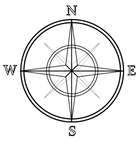The Most Influential
People in History

Augustin Louis Cauchy / koh-SHEE /
1789–1857
French Mathematician
Mathematics Ranking 21st of 46

Cauchy with his contour integral formula (upper right). The graph on the left illustrates a beautiful feature of contour integrals, which is that often the values of a complex function inside a loop are completely determined by the values of the function on the loop itself. The picture on the right shows that often the value of a contour integral of a function does not depend on the loop you integrate around, so long as the function is defined between the two curves: In context, the picture illustrates that the contour integral around the rectangle equals the contour integral along the two curves inside the rectangle. This formula is used extensively in various problems in physics. French stamp from 1989.
Mathematics–Calculus, Theory of Elasticity, Group Theory
Augustin Louis Cauchy’s numerous textbooks and writings introduced new standards of criticism and rigorous argument in calculus, from which grew the field of mathematics known as analysis. Cauchy transformed the theory of functions of complex variables by discovering his integral theorems and introducing the calculus of residues. His work in this area (functions of complex variables) was so extensive that he is considered to be the father of this branch of mathematics, which has grown enormously and entrenched itself in every branch of physics, particularly in wave mechanics and in relativity theory. Because wave mechanics is of crucial importance both in optics (electromagnetic waves) and electronics (electron waves), the study of functions of complex variables is required of all physicists, astronomers, and chemists.(1) Cauchy also founded the modern theory of elasticity, produced fundamental new ideas about the solution of differential equations, and contributed substantially to the founding of group theory.(2) In 1812, he summarized what was known of determinants at the time and introduced the word determinant to mathematics. More importantly, Cauchy started the theory of determinants as a distinct, independent branch of modern mathematics.(3)
Footnotes:
(1) Lloyd Motz and Jefferson Have Weaver, The Story of Mathematics (New York, 1993), p. 220.
(2) Judy Pearsall and Bill Trumble (editors), The Oxford Encyclopedic Dictionary (New York, 1996), p. 232.
(3) Jan Gullberg, Mathematics – From the Birth of Numbers (New York, 1997), p. 639.
1